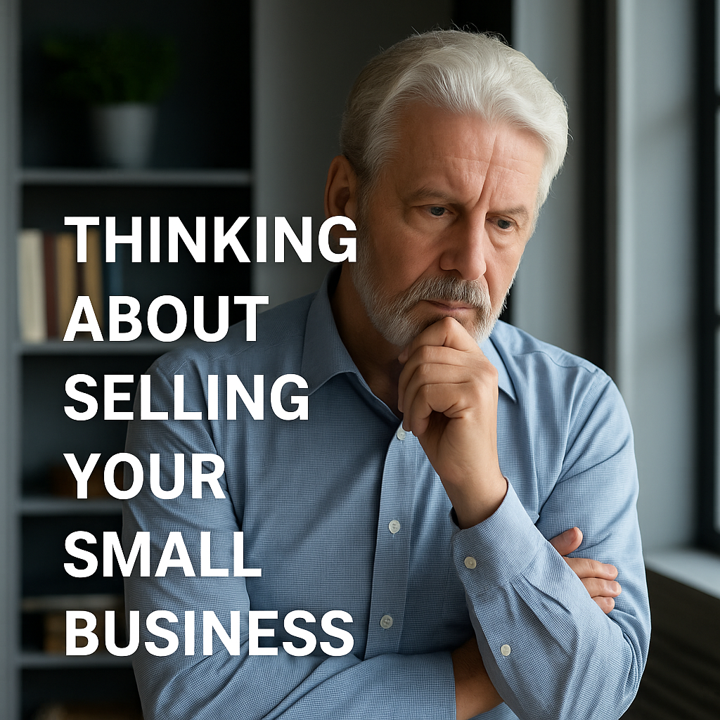8 Signs It’s Time to Sell Your Small Business
- Dennis Unrein
- Aug 28
- 4 min read
Thinking about retirement? Learn the key signs it’s time to sell your small business, especially for owners with under $2M in annual cash flow.

For many small business owners—especially Baby Boomers nearing retirement—the question isn’t if you’ll sell your business, but when.
Knowing the right time to sell is critical. Exit too early, and you may leave money on the table. Hold on too long, and you risk declining performance or a rushed sale.
If your company generates under $2 million in annual cash flow, timing the exit well is even more important. Buyers in this market are sensitive to earnings stability, growth potential, and owner involvement.
Here are the 8 most common signs it’s time to sell your small business.
1. You’re Nearing Retirement and Ready to Step Back
Baby Boomers own millions of small businesses in the U.S., and many are now approaching retirement. If you’re financially ready and want more time for family, travel, or a slower pace of life, selling can secure your legacy while freeing up your future.
2. The Business Has Reached Its Peak Value
Every business has a natural life cycle. If revenue and cash flow are stable or growing, and the market outlook is favorable, your company may be at its peak value. Buyers pay the most when they see consistent earnings and growth potential. Selling during this “sweet spot” maximizes payout.
3. Industry or Market Trends Are Changing
Small businesses under $2M in cash flow are often more vulnerable to shifts in customer behavior, new technology, or regulatory changes. If your market outlook looks less certain, it may make sense to sell while buyers still see upside.
4. You’re Experiencing Burnout
Running a small business takes energy. If you feel drained, unmotivated, or unwilling to reinvest your time, it can hurt performance. Buyers can sense when an owner is “checked out.” Selling before operations slip ensures you capture full value.
5. The Business Requires More Capital Than You Want to Provide
Eventually, many small businesses need fresh investment—new equipment, expansion, or technology upgrades. If you’re not interested in taking on debt or putting in more cash, it may be smarter to sell to a buyer with the resources to grow.
6. Your Personal Finances Depend Too Heavily on the Business
If most of your wealth is tied up in the company, selling can reduce risk and diversify your finances. A sale can provide stability, especially for retirement planning.
7. You’ve Received Unsolicited Interest From Buyers
If competitors, private equity groups, or individual buyers are approaching you, it’s a strong signal of demand. Even if you’re not actively planning to sell, strong unsolicited offers mean the market finds your business attractive right now.
8. Succession Plans Are Unclear
If there’s no family member or employee ready to take over, selling may be the best option. A buyer can bring fresh energy and resources while continuing the legacy you’ve built.
Final Thoughts
Selling a small business is both financial and personal. For retiring Baby Boomers and owners of companies with under $2M in annual cash flow, timing matters more than anything. If you recognize several of these signs, it may be time to start building your exit strategy.
The best outcomes happen when you plan in advance, gather clean financials, and understand the market for companies like yours. Whether you’re ready to retire or simply move on, selling at the right time ensures you protect the value of your hard work.
Frequently Asked Questions (FAQ)
Q: What’s the best age to sell my small business? There’s no perfect age, but many Baby Boomer owners choose to sell between 60–70, when retirement planning and health considerations become priorities.
Q: How long does it take to sell a small business under $2M cash flow? Most sales take 6–15 months from listing to closing, depending on industry, financials, and buyer demand.
Q: Should I sell if my business is still growing? Yes—growth can actually increase your valuation. Buyers prefer businesses with momentum. Selling while cash flow is stable or climbing often results in a higher multiple.
Q: How do I know what my business is worth? Valuation depends on cash flow (EBITDA or SDE), industry multiples, and growth potential. Most small businesses under $2M cash flow sell for 2–4x annual cashflow depending on size and business type
Q: Do I need a broker to sell my business? Not always. Some owners sell directly to buyers. But a business broker can help prepare financials, market the business, and negotiate terms to maximize value.
Disclaimer: The content provided by SMB PE LLC is for illustrative and educational purposes only and does not constitute financial, legal, or business advice. Past performance is not indicative of future results. Always do your own research (DYOR) and consult with qualified professionals before making any decisions. This email is for informational purposes only. For more, see our Disclaimer Notice at www(.)smb-pe(.)com/disclaimer
Comments